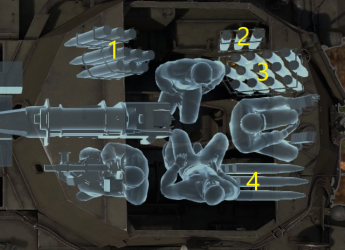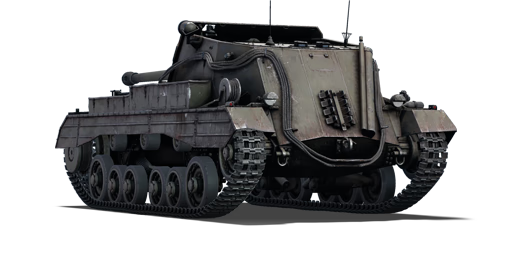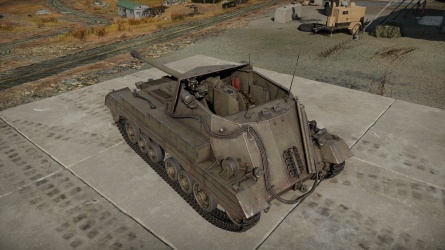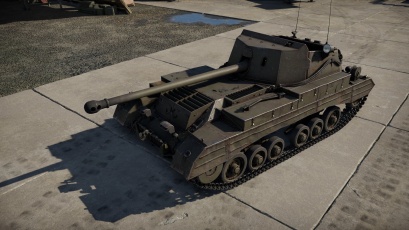Archer
Contents
Description
The Self Propelled 17pdr, Valentine, Mk I, Archer (also known as the Archer) is a Rank British tank destroyer
with a battle rating of (AB), (RB), and (SB). It was released along with the entire British tree line in Update 1.55 "Royal Armour". The Archer is a unique tank destroyer, as its gun faces the rear of the tank. The Archer can be good at both close combat- so long as you have somewhere to retreat to- and is also good at sniping. In a sense, you might consider the Archer to have two forward directions.
The Archer's armament is very good at this battle rating. The same cannon is even used on Rank III and IV tanks like the A30 Challenger and the Firefly. Its 9.0 second reload speed is not bad, but there are faster firing cannons at this rank such as both short and long German 75mm cannons, or the M4A1's cannon. However, the Archer can instantly destroy many enemy tanks, and if it doesn't destroy them it will damage them. If the enemy is not destroyed and they can shoot you, retreat and reload. Once reloaded you can try to destroy the enemy tank, but if its aiming in your direction you can try sneaking up on it. The Archer does not have a turret, but its gun can traverse further left and right than most non-turreted tank destroyers, including the StuG III F and SU-122. While these tank destroyers have a higher battle rating than the Archer, you may still encounter them.
General info
Survivability and armour
Armour type:
- Rolled homogeneous armour
| Armour | Front | Sides | Rear | Roof |
|---|---|---|---|---|
| Hull | 20 mm (32-33°) Front glacis 20 mm (27°) Lower glacis |
20 mm | 20 mm (23°), 14 mm (60°) Top 20 mm (0°), 14 mm (65°) Bottom |
10 mm |
| Superstructure | 20 mm (32-33°) Same as hull front | 20 mm (13-18°) | 20 mm (16-57°) Gun shield 100 mm Gun breech |
N/A |
Notes:
- "Front" of the vehicle is the direction the driver is facing.
- Suspension wheels, bogies, and tracks are 20 mm thick.
- Belly armour is 10 mm thick.
- A 9-12 mm RHA plate separate the crew compartment from the engine
Mobility
| Mobility characteristic | ||
|---|---|---|
| Weight (tons) | Add-on Armour weight (tons) |
Max speed (km/h) |
| 16.3 | N/A | 35 (AB) |
| 33 (RB/SB) | ||
| Engine power (horsepower) | ||
| Mode | Stock | Upgraded |
| Arcade | 273 | 336 |
| Realistic/Simulator | 170 | 192 |
| Power-to-weight ratio (hp/ton) | ||
| Mode | Stock | Upgraded |
| Arcade | 16.75 | 20.61 |
| Realistic/Simulator | 10.43 | 11.78 |
Armaments
Main armament
| 76 mm OQF 17-pounder | |||||
|---|---|---|---|---|---|
| Capacity | Vertical guidance |
Horizontal guidance |
Stabilizer | ||
| 39 | -7°/+15° | ±22.3° | N/A | ||
| Turret rotation speed (°/s) | |||||
| Mode | Stock | Upgraded | Prior + Full crew | Prior + Expert qualif. | Prior + Ace qualif. |
| Arcade | 1.5 | 2.1 | __.__ | __.__ | __.__ |
| Realistic | 1.5 | 1.8 | __.__ | __.__ | __.__ |
| Reloading rate (seconds) | |||||
| Stock | Prior + Full crew | Prior + Expert qualif. | Prior + Ace qualif. | ||
| 7.4 | __.__ | __.__ | __.__ | ||
Ammunition
| Penetration statistics | ||||||||
|---|---|---|---|---|---|---|---|---|
| Ammunition | Type of warhead |
Penetration in mm @ 90° | ||||||
| 10m | 100m | 500m | 1000m | 1500m | 2000m | |||
| Shot Mk.6 | AP | 160 | 157 | 133 | 112 | 96 | 86 | |
| Shell Mk.1 | HE | 9 | 9 | 9 | 9 | 9 | 9 | |
| Shot Mk.4 | APC | 165 | 160 | 138 | 108 | 94 | 81 | |
| Shot Mk.8 | APCBC | 171 | 168 | 156 | 143 | 130 | 120 | |
| Shell details | ||||||||||
|---|---|---|---|---|---|---|---|---|---|---|
| Ammunition | Type of warhead |
Velocity in m/s |
Projectile Mass in kg |
Fuse delay
in m: |
Fuse sensitivity
in mm: |
Explosive Mass in g (TNT equivalent): |
Normalization At 30° from horizontal: |
Ricochet: | ||
| 0% | 50% | 100% | ||||||||
| Shot Mk.6 | AP | 883 | 7.7 | N/A | N/A | N/A | -1° | 47° | 60° | 65° |
| Shell Mk.1 | HE | 883 | 7.0 | 0.4 | 0.5 | 580 | +0° | 79° | 80° | 81° |
| Shot Mk.4 | APC | 883 | 7.7 | N/A | N/A | N/A | -1° | 48° | 63° | 71° |
| Shot Mk.8 | APCBC | 883 | 7.7 | N/A | N/A | N/A | +4° | 48° | 63° | 71° |
Ammo racks
Last updated: 1.77.2.149

| Full ammo |
1st rack empty |
2nd rack empty |
3rd rack empty |
4th rack empty |
Visual discrepancy |
|---|---|---|---|---|---|
| 39 | 30 (+9) | 20 (+19) | 10 (+29) | 1 (+38) | No |
Rear empty: 20 (+19)
Usage in the battles
You should use the true forward direction (Opposite of the gun) to travel from place to place as its reverse speed is low. You should travel in the direction of the gun when approaching an enemy or an area with combat taking place. Once you can shoot the enemy, fire a round at them and quickly go in the true forward direction to retreat. The same applies to when you're sniping, fire a shot and retreat. Again, the Archer can be played in both close combat and sniping, but be sure not to get too close.
The Archer has an open top, so you will need to be careful about machine guns and artillery. Its faster forward speed can allow you to escape from planes who are attacking you. You should also note that the Archer is faster than all three Valentines. While it is based on a Valentine, its reverse speed is about double the reverse speed of a Valentine, and its forward speed is about 9 km/h faster.
When ever facing tanks of any battle rating and rank, always be on alert and always have a back up plan as most tanks may be able to knock out the Archer in one shot. Do not worry, always play safely and stay at a reasonable distance from the cap circle or in an area which can be a chock point for the enemy team. Always make sure you are in an area where they have to face the tank from in the cannon's arc to always have a first shot opportunity and have the enemy back off from charging straight into the Archer's field of fire. If a plane or tank starts strafing the Archer, pull out and find a new location as that place is now compromised and a wary pilot or flanking enemy could put an end to the Archer's career.
Modules
As usual, it is recommended to research "Parts" first, particularly due to the vehicle's need to expose its engine to aim at an enemy. Engine damage is, of course, very crippling, and unfortunately a recurrent phenomenon for the Archer, and as such repairing it is priority whenever it occurs. After that, you should research the Horizontal Drive because the Archer's turret traverse speed is sluggish.
Pros and cons
Pros:
- Ability to move faster in the opposite direction of the gun can allow for a quick retreat.
- The vehicle's cannon is good for its battle rating.
- The vehicle's horizontal cannon traverse traverse is wider than most turret-less tank destroyers.
- The direction configuration can confuse or surprise enemies.
Cons:
- It can be hard to master this vehicle as the gun does not face forward.
- Because the gun faces the rear of the vehicle, the enemy can shoot your engine and immobilise you when you engage.
- Only travels about 4 km/h backwards, which makes it hard to move in the direction of your gun.
- Very slow cannon traverse speed makes aiming at moving targets difficult.
- Heavy calibre fire, especially from 20mm's, will rip through armour at any angle, but the transmission within the firing arc can soak up shots.
History
Development
The production of the 17-pounder anti-tank gun for British service gave the British military firepower capable of destroying the heavier German tanks, however the gun's heavy weight and bulkiness presented a mobility issue for the crew. An attempt to make a mobile version was done in 1942, first with the 3 inch Gun Carrier as a self-propelled mount, then with the M10 tank destroyer from the Americans which proved more successful. Another project done was to use obsolete tank chassis and convert them into mounts for use, like the Crusader cruiser tanks and the Valentine infantry gun. The Valentine was chosen for further development as it was one of the more reliable tanks in British service and had the specifications needed to mount the gun. The modified Valentine, known as the Self Propelled 17pdr, Valentine, Mk.I, Archer, was given a more powerful engine and a case mate superstructure on the front. The most distinctive feature of the Archer compared to any other tank destroyers in the war was that its gun is not facing forward, rather to the rear. This had a benefit of reducing the vehicle's length by making the gun stretch out over the rear hull of the vehicle, limiting the gun from extending over the vehicle. The rear gun mounting, despite its unorthodox method, allowed the Archer to become an excellent ambush weapon, by firing at targets with its gun and able to speed away forward at full speed rather than reverse. The first prototype of the Archer was made in 1943, trials were carried out in April 1943, which concluded favorable and was 800 was ordered from Vickers and accepted into service in October 1944. Vickers were able to complete 655 Archer tank destroyers from March 1943 to until the end of the war in May 1945.
Combat usage
The Archer was used in the Italian front and the European campaign against Germany. As a self-propelled gun, the Royal artillery had authority over the tank destroyer just like other tank destroyers in British service. Reception to the Archer proved that the crews favor the Archer over the M10 Achilles due to the better tactics the Archer presented by shooting then speeding away before the enemy could discover them. Though the drawbacks of the crew positions, open-topped superstructure, and limited gun traverse limited the Archer's capabilities, this was mitigated by its role as a tank destroyer and was used in World War II until the end.
Britain continued to use the Archer up until the 1950s. Once retired, some were sold to the Egyptian Army, to which they reported using it during the Suez Canal crisis in 1956. After that, no further action reports are known with the Archers.
Media
Skin and Camouflages for the Archer in Warthunder Live.
Read also
Links to the articles on the War Thunder Wiki that you think will be useful for the reader, for example,
- reference to the series of the vehicles;
- links to approximate analogues of other nations and research trees.
ETC.
Sources
| Britain tank destroyers | |
|---|---|
| Infantry tank derivatives | Archer · Gun Carrier (3-in) |
| Light tank derivatives | Alecto I |
| M10 Achilles | Achilles · Achilles (65 Rg.) |
| Centurion derivatives | FV4005 · Conway |
| ATGM | Swingfire · Striker |
| Other | Tortoise · ▄M109A1 |
| Canada | QF 3.7 Ram |
| South Africa | G6 · ZT3A2 |






